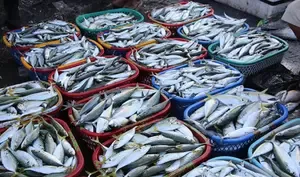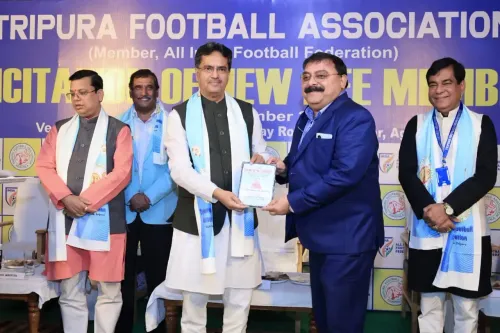India Set to Join Global Fisheries Certification by 2025

Synopsis
Key Takeaways
- India aims for global fisheries certification by 2025.
- Sustainable fisheries are nearing completion of Fishery Improvement Projects.
- Demand for certified seafood is rising in global markets.
- 63 countries are actively involved in MSC certification.
- Integrating sustainability into university curricula is essential.
Kochi, March 10 (NationPress) In a significant advancement for India’s seafood export, the country is projected to achieve entry into the global fisheries certification by the conclusion of 2025.
A stakeholder workshop conducted in Kochi on Monday underscored that India is making substantial strides towards sustainable fisheries, with most of the prioritized species nearing the finish line of Fishery Improvement Projects (FIPs).
This is vital for evaluating the fishery against the standards of Marine Stewardship Council (MSC) certification, which encompasses sustainable stock levels, minimal environmental impact, and effective fishery management systems.
The capacity-building workshop was organized by the Sustainable Seafood Network India (SSNI) in collaboration with various stakeholders to provide them with the principles of MSC certification and to explore the progress towards sustainable fisheries management in India.
Marine scientists, government officials, environmentalists, certification experts, and exporters were in attendance. In India, a dozen prioritized fisheries have already undergone pre-assessments against the MSC Standards, allowing stakeholders to formulate clear action plans for enhancement.
The demand for certified seafood has experienced a notable rise in global markets, as highlighted during the workshop. Amanda Lejbowicz, Head of Fisheries Standard Accessibility of MSC, London noted that over 15 percent of the total marine catch worldwide is certified fishery.
“Certified seafood products in various forms such as canned, chilled, frozen, and baby foods are increasing, with canned products seeing a 9 percent rise in demand last year,” stated Lejbowicz.
On the expanding status of fisheries certification, she mentioned that more countries are joining the initiative, with 63 countries currently actively participating in MSC certification.
“With the growing global focus on sustainability, eco-labeling has become a crucial component in market access, competitiveness, and export growth. International buyers, particularly in Europe, the US, and Japan, are increasingly insisting on certified sustainable seafood,” remarked Lejbowicz.
Dr Sunil Mohamed, a distinguished marine scientist and Chairman of the SSNI, emphasized the essential need to incorporate sustainability certification and auditing into university fisheries curricula to ensure a steady supply of auditing professionals in the sector.
The Marine Stewardship Council (MSC) is an international non-profit organization that establishes globally accepted standards for sustainable fishing and the seafood supply chain.










